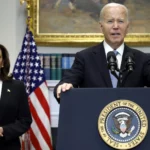It has come to my attention that the United States has a new Congress in session. It took some doing, but we even have a new speaker of the House, along with 86 new members in the House and Senate (48 Republicans and 38 Democrats). This column is for them (or, perhaps more accurately, for the staff members who will do the real work).
For starters, I know that many of you don’t care that much about international affairs, and neither do most of your constituents. The United States’ foreign-policy establishment may work overtime trying to manage the world (and spread liberal values when it has the chance), but most Americans remain ignorant of and largely indifferent to issues of foreign policy, save in the wake of tragic events such as 9/11. There’s broad but shallow support for an “active role” in world affairs, but domestic issues are almost always considered more important by most Americans. It’s a paradox: The United States plays an outsize role in the world and devotes a big chunk of the federal budget to foreign policy and national security, yet its citizens’ attention is usually riveted closer to home.
I’m not going to try to tell you how to get reelected; you’ve proved that you know more about winning votes than I do. Instead, I’ll stick to my lane and focus on a few things you might want to know about the wider world and the United States’ position in it. (If you have a fundraiser to attend and are pressed for time, you could read a previous column of mine, on how to get a degree in international relations in five minutes.)
Here’s the first thing you ought to wrap your brain around: The United States’ position in the world ain’t what it used to be. Don’t misunderstand me, it is still the world’s most powerful country, and its prospects are bright provided it doesn’t make too many mistakes at home or abroad. Our military forces are still formidable (if not quite as omnipotent as they appeared in the 1990s), the U.S. economy is outperforming many others, and we retain disproportionate influence in the global financial order. U.S. support and protection is still welcome in many places, if not as widely as it once was.
Here’s what’s different: When the Soviet Union collapsed in the early 1990s, the United States found itself in an unprecedented position of primacy. This was probably when many of you began your professional lives or started paying attention to politics. In this era, the United States was far stronger than any other single country and on relatively good terms with all the major powers in the world, including Russia and China. Future historians will debate exactly why the “unipolar moment” was so brief (Russia recovered, China kept growing rapidly, the United States squandered trillions of dollars in foolish wars, etc.); what you need to realize is that we are back in a world of competing great powers and rising stakes, where mistakes can have truly serious consequences. Competing effectively in that world requires a clear understanding of what our interests are, the ability to set priorities and stick to them, and a sober awareness of what U.S. power can and cannot accomplish. It also behooves us to keep our domestic divisions within bounds. Partisan warfare for its own sake is never a good thing, but it is increasingly an indulgence we cannot afford.
Second, you need to recognize that other states have their own interests and objectives, and even our friends’ interests don’t always line up with ours. India is a useful partner in the Indo-Pacific, for example, but it has remained resolutely neutral on the Ukraine conflict and is still buying lots of Russian oil and gas. Israel and Saudi Arabia are longtime U.S. allies, but neither of them is lifting a finger to help Ukraine, either. Instead, Saudi Arabia recently hosted Chinese President Xi Jinping for a series of summit meetings and rejected U.S. requests that it avoid cuts in oil production to help undermine Russia’s war effort and tame inflation. U.S. allies in Europe and Asia have doubts about the wisdom of the “chip war” with China, as it threatens to derail their own economic ties with the world’s second-largest economy.
My advice: Get used to this. In the emerging multipolar world, other states are going to pursue their own interests—just as we pursue ours—and they will have more latitude than they did when Washington was the only game in town. If we want others to support us—and we do—we need to appreciate what their interests are and not expect them to simply fall into line.
Here’s another thing you should be aware of: Whatever you may have heard, the United States is not disengaging, adopting a grand strategy of “restraint,” retreating to isolationism, or anything remotely like that. On the contrary: The United States is now trying to inflict decisive defeats on two major powers simultaneously. We are trying to help Ukraine inflict a military defeat on Russia. As Defense Secretary Lloyd Austin put it shortly after the war broke out, we “want to see Russia weakened to the degree that it can’t do the kinds of things that it has done in invading Ukraine.” At the same time, we are trying to inflict an economic and technological defeat on China that will slow its rise and preserve U.S. dominance for decades to come. Washington is walking a fine line in both cases—trying to defeat Russia without triggering unwanted escalation and trying to weaken China without crashing the world economy, provoking an attack on Taiwan, or disturbing allies who want to preserve their own economic ties with China. Whatever this strategy is, it ain’t retrenchment.
The war in Ukraine also underscores the continued importance of hard power—including military power—as well as the trouble that states can get into when they use it unwisely. Military force is a regrettable necessity in a world where no supreme body exists to protect states from each other, but it is also a crude instrument whose effects are hard to foresee. Russian President Vladimir Putin’s inept invasion demonstrates how easy it is for leaders to miscalculate, but even successful military operations generate unintended consequences that can be as challenging to address as the original problem they were intended to solve.
I mention this problem because you could face a moment when someone—another member of Congress, a representative of the executive branch, a lobbyist from some interest group, a foreign ambassador, or perhaps some well-credentialed expert from a think tank—is going to tell you about some looming danger that they believe must be addressed without delay. They will try to convince you that the dangers of inaction are grave, the risks of using force are minimal, and the benefits of acting now are enormous. And it is barely possible that they are right; sometimes the use of force is hard to avoid.
Source : Foreign Policy















